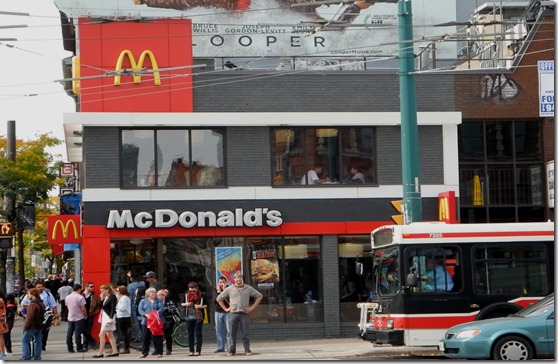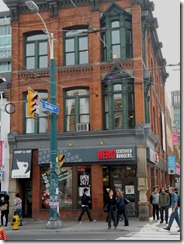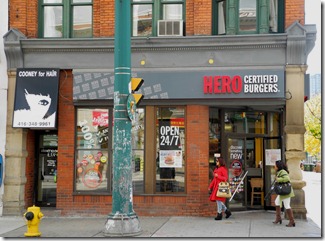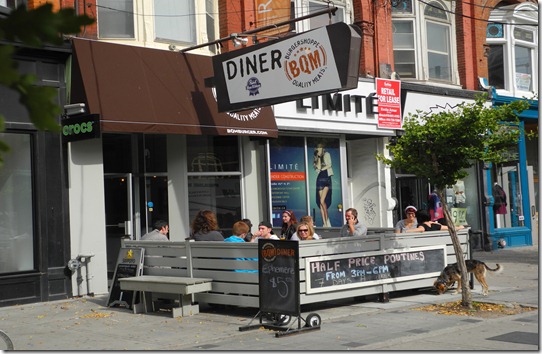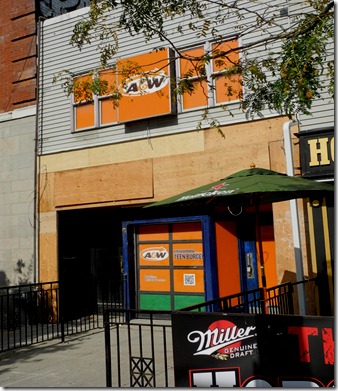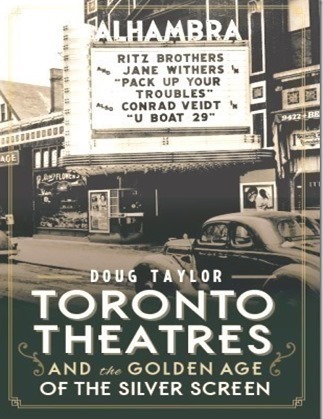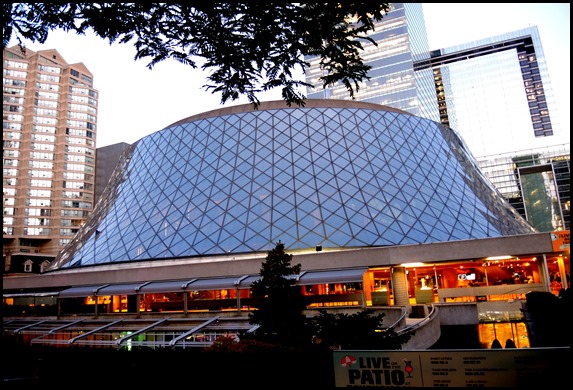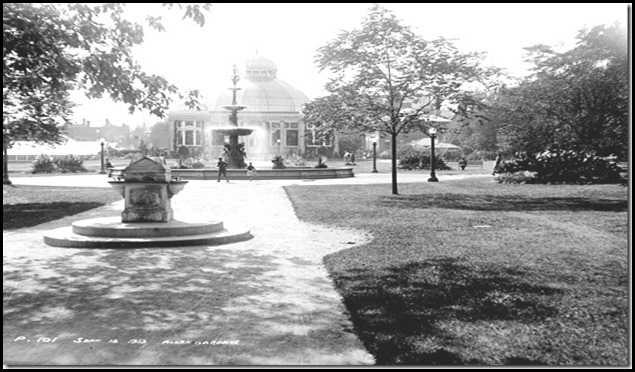The corner of Queen Street West at Spadina Avenue seems to becoming a haven for hamburger outlets. There are already three places specializing in hamburgers at this intersection, and a fourth is soon to open. The hamburger, once a low-budget fast food, is becoming a gourmet item, with some burgers priced as high as $50 in a few places. Even is some budget restaurants, hamburgers can be expensive due to the wide choice of gourmet toppings.
However, despite the popularity of hamburgers, I cannot understand why there is such a concentration of outlets at the corner of Queen and Spadina. Perhaps it is because the intersection attracts so many of the late-night crowd. However, I doubt that these people will be paying $50 to satisfy their hunger.
On the northwest corner of the intersection is a Mcdonald’s, located on the site of the old Mary Pickford Theatre
On the southeast corner is Hero Burgers, in the building that in the 1880s was dry goods store
On the north side of Queen St., a few doors east of Spadina is the BMQ hamburger restaurant. It offers a choice of three grades of beef and a wide selection of toppings.
Now, on the site of the former Gorilla Monsoon, an “A & W” is under construction.
To view other posts about the area where “hamburger haven” is located.
Cycling on the streets near Queen and Spadina:
Examining “sinful, saucy Spadina” from its beginnings at the lake, northward to Bloor Street.
https://tayloronhistory.com/2012/09/28/sinfully-saucy-and-diversetorontos-spadina-avenue/
Interesting historic buildings a short distance north of Queen and Spadina
The historic site at Queen and Spadina where a Macdonald’s franchise is located.
https://tayloronhistory.com/2012/08/27/mcdonalds-at-queen-and-spadina-on-an-historic-site/
The famous Cameron House, a short distance west of Queen and Spadina
To view the Home Page for this blog: https://tayloronhistory.com/
Links to other posts about the history of Toronto and its buildings:
https://tayloronhistory.com/2013/10/08/links-to-historic-architecture-of-torontotayloronhistory-com/
Links to posts about Toronto’s movie houses—past and present.
https://tayloronhistory.com/2013/10/09/links-to-toronto-old-movie-housestayloronhistory-com/
Recent publication entitled “Toronto’s Theatres and the Golden Age of the Silver Screen,” by the author of this blog. The publication explores 50 of Toronto’s old theatres and contains over 80 archival photographs of the facades, marquees and interiors of the theatres. It also relates anecdotes and stories from those who experienced these grand old movie houses.
To place an order for this book:
Theatres Included in the Book
Chapter One – The Early Years—Nickelodeons and the First Theatres in Toronto
Theatorium (Red Mill) Theatre—Toronto’s First Movie Experience and First Permanent Movie Theatre, Auditorium (Avenue, PIckford), Colonial Theatre (the Bay), thePhotodome, Revue Theatre, Picture Palace (Royal George), Big Nickel (National, Rio), Madison Theatre (Midtown, Capri, Eden, Bloor Cinema, Bloor Street Hot Docs), Theatre Without a Name (Pastime, Prince Edward, Fox)
Chapter Two – The Great Movie Palaces – The End of the Nickelodeons
Loew’s Yonge Street (Elgin/Winter Garden), Shea’s Hippodrome, The Allen (Tivoli), Pantages (Imperial, Imperial Six, Ed Mirvish), Loew’s Uptown
Chapter Three – Smaller Theatres in the pre-1920s and 1920s
Oakwood, Broadway, Carlton on Parliament Street, Victory on Yonge Street (Embassy, Astor, Showcase, Federal, New Yorker, Panasonic), Allan’s Danforth (Century, Titania, Music Hall), Parkdale, Alhambra (Baronet, Eve), St. Clair, Standard (Strand, Victory, Golden Harvest), Palace, Bedford (Park), Hudson (Mount Pleasant), Belsize (Crest, Regent), Runnymede
Chapter Four – Theatres During the 1930s, the Great Depression
Grant ,Hollywood, Oriole (Cinema, International Cinema), Eglinton, Casino, Radio City, Paramount, Scarboro, Paradise (Eve’s Paradise), State (Bloordale), Colony, Bellevue (Lux, Elektra, Lido), Kingsway, Pylon (Royal, Golden Princess), Metro
Chapter Five – Theatres in the 1940s – The Second World War and the Post-War Years
University, Odeon Fairlawn, Vaughan, Odeon Danforth, Glendale, Odeon Hyland, Nortown, Willow, Downtown, Odeon Carlton, Donlands, Biltmore, Odeon Humber, Town Cinema
Chapter Six – The 1950s Theatres
Savoy (Coronet), Westwood
Chapter Seven – Cineplex and Multi-screen Complexes
Cineplex Eaton Centre, Cineplex Odeon Varsity, Scotiabank Cineplex, Dundas Square Cineplex, The Bell Lightbox (TIFF)
